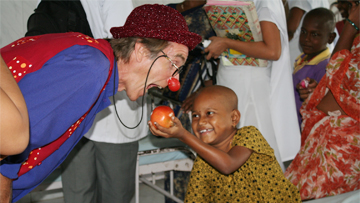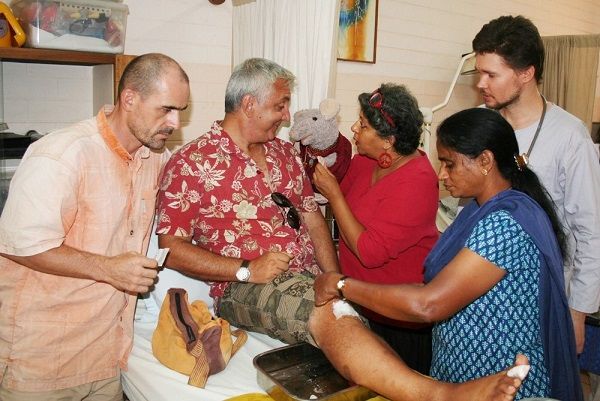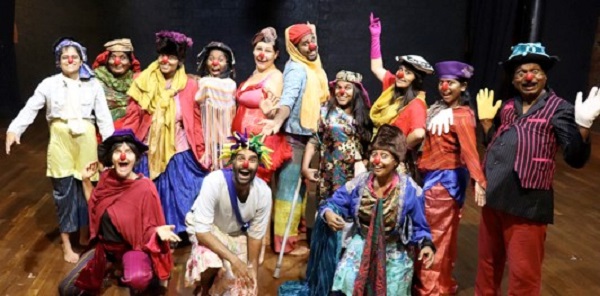
Medical or therapeutic clowns can bring in smiles and comfort where there is disease and trauma. The MeDiClown Academy started by Fif Fernandes and Hamish Boyd in Auroville has been bringing joy to patients and aims to create MeDiClowning as a recognised profession in India.
The concept of medical clowns is still new in India. Could you tell us a little about your enterprise the MeDiClown Academy?
MediClown Academy became a registered activity of the Auroville Foundation in 2013. We have developed multiple creative, inspiring, empowering and effective ways to approach many sources of stress…the outcome always aims at regaining wholeness. Medical procedures can be scary, for people of all ages. MeDiClowns play a key role in distracting or re-directing focus with the patient, which helps to ease the physical and emotional pain. At MeDiClown Academy, MeDiClowns work towards conscious redirection of attention and focus. The key is to empower the patient. MeDiClowns stimulate patients’ imagination to create stories and empower them to become actors of their healing process. They will play around the room, engaging with patients, families and medical staff to create a positive and more relaxed atmosphere.
What is the role of a MediClown?
The role of the MeDiClown is to make a heart connection with people of all ages and backgrounds, bringing joy and hope into lives, lightening up situations, stimulating play and laughter to ease stressful, difficult or painful circumstances. They work with various individuals and communities to improve mental, emotional and physical well-being. They are attentive to the needs of the wide range of people they engage with from newborns to senior citizens.

What tools and techniques do MeDiClowns use to engage with patients?
MeDiClowns use numerous techniques such imagination, improvisation, play, juggling, dance, music, storytelling, puppetry, magic, humour and laughter, which are adapted to any situation at hand. We also have some swinging chimes, harmonica, ukulele and other musical instruments for sound therapy.

What is the vision of your Academy?
The Academy aims to transform health and social well-being through Medical Clowning in rural and urban India. MeDiClown Academy is an integral approach to healing, well-being and life-long learning; bringing joy, love and laughter into daily living, in healthcare, education or corporate environments.
What is the difference between clown and a medical clown?
The difference between a clown and a Medical clown is that they both start with a similar foundation, which includes improvisation, theatre and clowning techniques. But the range of action of the MeDiClown goes beyond just laughter and entertainment, depending on the context: healthcare, education or organisations. The intensive training is multidisciplinary and includes, among other things, psychology, sociology and medical anthropology. In addition, their listening and empathic skills are sharpened through theatrical exercises. They also receive continued mentoring and supervision in the fields of healthcare, education and organisation.
For what medical conditions do MeDiClowns visit inpatients and outpatients?
All types of medical conditions because the human spirit does not box conditions. When it comes to happiness and mindfulness, and engagement with emotions and feelings, it is across the spectrum. MeDiClowns visit both inpatient and outpatient wards for all adult and paediatric wards including Intensive Care, Neo-Natal Intensive Care, Haematology/Oncology, Emergency Department, Physical Therapy, Burn, Bone Marrow Transplant, AIDS, Nephrology, Neurology, Cardiology and Palliative Care. MeDiClowns also offer individual and group homecare visits.
What are the benefits of MediClowning to patients?
- Reduction of pain and stress perception
- Strengthening of the immune system
- Lightens up the fear of the unknown
- Channels nervous energy or built up tension into healthy expression
- Relief of fear, anxiety and apprehension
- Humanizes challenging medical environments and interventions
- Allowing patients to express their unpleasant feelings in healthy way
- Interrupts blocked patterns that may be interfering with the healing journey
What about geriatric patients – are they accepting of MeDiClowns?
Yes very much so. They are eager to make connections, and we have found, they enjoy and appreciate visits from our MeDiClowns because many of them are lonely. They have had very productive lives, and the MeDiClown honour them and listens to their stories. MeDiClowns can help to recreate and act out / perform the patient’s life through story and role-play, offering fun, dignity and a change in perception of their life. Some people are nonresponsive, but that does not mean they are not taking in what we may be doing.
- Reconnecting and grounding dementia patients with their current surroundings
- Improve communication with staff
- Brings back a sense of humour into difficult life and health conditions
- MeDiClowning is a powerful and complementary addition for chronic and degenerative conditions like dementia, Alzheimer’s, Parkinson’s and cancer
- Nursing staff report that MeDiClowning contributes to the reduction of patients’ aggressive behavior in nursing homes and enhances a more positive and happier attitude towards life.
Who are the key beneficiaries of your services?
Currently, hospitals, healthcare and corporate sectors, and educational institutions are some of the key beneficiaries of our services. MeDiClown Academy is now offering a “Fellowship in the Arts and Science of MeDi Clowning”. With this, MeDiClown Academy aims to create a new stream of career opportunities and to establish MeDiClowning as a recognized profession in India.
What about more serious condition like suicide attempt, or sexual assault, bereavement?
These can be difficult moments but you just have to be there, in the present moment and with an open heart. A suicide attempt or a suicide can be devastating for the individual or the family. At these critical moments it is important to be present and to do what is required at the time. It may be sitting quietly holding their hand, breathing together or saying a prayer of their own faith. We have had patients request our presence as they have breathed their last. We have been to several funerals and memorials in our clown persona because people don’t know us. They know the clown.
How do you view the Indian scenario of clowning for therapeutic reasons?
Our biggest challenge is that MediClowning is a new field in India and not widely known. Most people think a Mediclown is a just joker. His aim is to make people laugh. But for us our act is a lot more than that. It is deeper than that. We work at the physical, biological, emotional, spiritual, mental level simultaneously. Our basic objective is to heal.

What would are the major skills required to be a successful medical clown?
Successful MediClowns have an unstoppable urge and enthusiasm to connect with people and positively transform their being. They have an uncanny ability to interact with people without any judgement. They create an atmosphere of openness through deep listening and true empathy. They use art of storytelling, humour, and theatrics to bring instant joy, and thoughtlessness. They act in the moment, with intuition, working with objects, and props from their surroundings to create positive energy and joy that is infectious. They have the innate ability to embrace people, from all walks of life without discrimination, even in unfamiliar situations and create joy and happiness.






